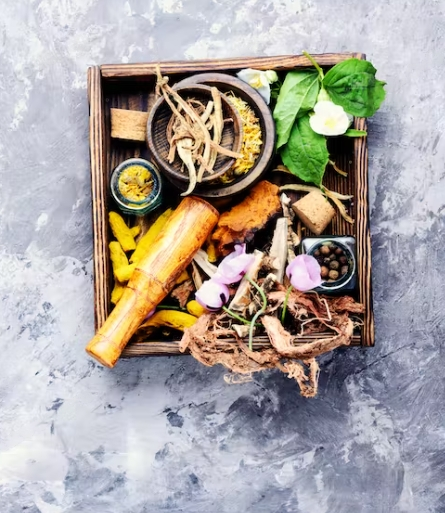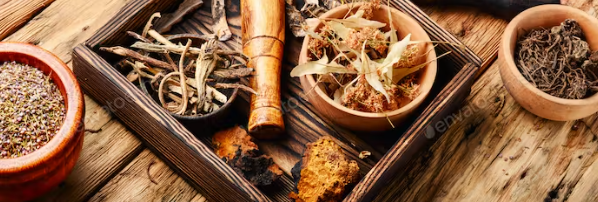
Herbs have traditionally been used to lower blood pressure, and some evidence suggests that they may be more effective than medications.
Several herbs help reduce blood pressure. It is important to note that not all herbs are effective for all people, so it is essential to speak with a healthcare provider before taking any herbal supplements.
The 20 Best Herbs for Blood Pressure

1. Basil
Basil, one of the herbs used in cooking, has many health benefits that can help control blood pressure. Basil is high in antioxidants, which have been shown to reduce the risk of heart disease and other chronic diseases.
Additionally, basil can help lower blood sugar levels and improve insulin sensitivity. Basil is a great herb for those trying to improve their overall health. It has many advantages for people with hypertension, such as reducing inflammation and supporting better blood flow.
By incorporating basil into your diet and lifestyle, you can enjoy better blood pressure control and overall well-being.
2. Cardamom
Cardamom is a popular spice used in many dishes around the world. It has many benefits for blood pressure, including reducing inflammation and improving heart health.
The cardamom plant is native to India and Sri Lanka, and it is commonly used in Ayurvedic medicine as a remedy for hypertension. There are several reasons why cardamom may be effective for lowering blood pressure.
- First, it contains compounds that can decrease blood flow and inflammation.
- Second, it has natural properties that help to improve blood circulation and reduce the risk of heart disease.
- Finally, cardamom can help to regulate blood sugar levels by increasing insulin sensitivity.
Overall, these benefits make cardamom a great choice for anyone looking to lower their blood pressure naturally.
3. Parsley
Parsley is a versatile and healthy herb that can be used to improve blood pressure. Parsley has many benefits making it an excellent choice for people with hypertension, including:
- High potassium levels, help lower blood pressure.
- Parsley is a good source of fibre and antioxidants, which have been shown to help reduce the risk of heart disease.
- And it has anti-inflammatory properties that can help reduce the risk of hypertension-related conditions such as stroke.
4. Garlic
Garlic is a member of the Allium family, including onions and leeks,and has been used for centuries as a natural remedy for blood pressure. Today, many scientific studies back up garlic’s benefits for lowering blood pressure. Here are a few:
- Garlic lowers blood pressure by relaxing blood vessels.
- It can help to prevent atherosclerosis, the build-up of plaque in arteries.
- It can help to improve cholesterol levels and reduce the risk of heart disease.
- It can also help to reduce inflammation, which is thought to be responsible for many health problems, including hypertension.
- Finally, garlic may have anti-cancer properties.
5. Celery seeds
Celery seeds have been traditionally used as a treatment for high blood pressure. Celery seeds have been shown to lower blood pressure in humans and experimental animals.
One reason celery seeds may effectively lower blood pressure is that they contain nitrates. Nitrates are converted into nitric oxide by the body, which has been shown to play an important role in regulating blood pressure.
Nitric oxide is a key regulator of cardiovascular function and has been linked to a reduced risk of heart disease and stroke.
Additionally, celery seeds contain phytochemicals that may contribute to the anti-hypertensive effects.
6. Bacopa monnieri
If you are looking for a natural way to help reduce blood pressure, consider using herbs. One such herb is Bacopa monnieri. This plant has been traditionally used in India to treat hypertension and other conditions.
There are many benefits to using Bacopa monnieri for blood pressure control, including:
- Bacopa monnieri can help lower blood pressure by increasing the production of nitric oxide. Nitric oxide is a gas that helps to relax arteries and lower blood pressure.
- Additionally, bacopa monnieri may also improve heart health by reducing the risk of cardiovascular disease and stroke. Studies have shown that this herb may also reduce inflammation, associated with many diseases, including heart disease and stroke.
- Bacopa monnieri may also improve cognitive function and memory formation.
7. Chinese cat’s claw
The Chinese cat’s claw has been used as a natural remedy for hypertension since ancient times. It’s an herb native to central and eastern Asia and has been used in traditional medicine for its anti-inflammatory, antioxidant, and blood pressure-lowering properties.
In recent years, studies have found that the Chinese cat’s claw may also reduce the risk of heart disease. There are many benefits to using Chinese cat’s claw as a natural remedy for hypertension.
Additionally, the Chinese cat’s claw is a powerful antioxidant which can help protect the body against damage caused by free radicals.
8. The Ginger
Ginger is a popular herb used for many purposes, but one of the most popular uses is for blood pressure. Ginger is beneficial in reducing high blood pressure, and there are several reasons why this may be the case.
- First and foremost, ginger contains properties that can help to relax the blood vessels and reduce inflammation.
- Secondly, ginger has been shown to help increase circulation and promote healing.
- Finally, ginger also has anti-inflammatory properties, which can help to reduce swelling and improve pain relief.
All these factors make ginger an excellent choice for people with high blood pressure looking for ways to improve their health overall.
9. Cinnamon
Cinnamon is a member of the spice family and contains compounds that can affect blood pressure. In addition, cinnamon is also an antioxidant, which means it helps protect against damage to cells.
There are many benefits to including cinnamon in your diet for blood pressure control. For one, cinnamon is a source of manganese, which helps regulate blood sugar levels.
Manganese also helps reduce the risk of heart disease and stroke. Additionally, cinnamon can help improve cholesterol levels and reduce the risk of developing gallstones.
Finally, adding cinnamon to your diet may help you lose weight since it’s high in fibre and antioxidants.
10.Thyme
Thyme is one of the most popular herbs for blood pressure because of its wide array of benefits. Thyme lowers blood pressure by decreasing the amount of sodium and water in the blood. It also reduces the tendency of blood vessels to narrow, which can lower blood pressure.
Additionally, thyme has anti-inflammatory properties, reducing swelling and pain in the muscles and joints associated with high blood pressure.
Finally, thyme is a diuretic, which can help you expel more water from your body than you take in, leading to reduced swelling and weight gain due to increased fluid retention.
Together, these properties make thyme an excellent choice for managing high blood pressure.
11. Onions
Onions are a great addition to any diet for improving blood pressure. They contain high levels of nitrates, which can help to lower blood pressure in people who have hypertension.
Additionally, onions contain other nutrients that may be beneficial for managing blood pressure, such as potassium and vitamin C.
One study found that people who consumed onion juice three times per day had reductions in systolic and diastolic blood pressures compared to those who didn’t consume onion juice.
12. Turmeric
Turmeric is a spice derived from the root of the Curcuma longa plant. The active component in turmeric, curcumin, is beneficial for blood pressure. Curcumin has been shown to lower blood pressure by increasing nitric oxide levels, which relaxes the blood vessels and lowers blood pressure.
Additionally, curcumin has been shown to reduce inflammation and promote antioxidant activity. Thus, turmeric may provide several benefits for individuals with hypertension, including reduced symptoms and improved quality of life.
13. The Cayenne Pepper
Cayenne pepper is a spice that has been used for centuries to help reduce blood pressure. It contains capsaicin, which is a compound that helps to relax the blood vessels and lower blood pressure.
There are many benefits to using cayenne pepper as a herbal remedy for blood pressure.
First, cayenne pepper can help to improve overall circulation and promote better heart health. Additionally, cayenne pepper can boost the immune system and help to fight inflammation.
Finally, cayenne pepper can also help regulate blood sugar levels and bring about other positive effects on the body’s overall health.
14. Buchu
Buchu is a popular herbal remedy for high blood pressure. In traditional African medicine, buchu is used to improve blood circulation and reduce inflammation.
Buchu’s active ingredients, especially oxalic acid, have been shown to help lower human blood pressure.
Additionally, buchu has been shown to have other beneficial effects on the cardiovascular system, including reducing heart rate and the risk of heart attack and stroke.
Buchu is also known to improve cognitive function and reduce anxiety symptoms. Therefore, buchu may offer some important benefits for people with high blood pressure.
15. Flaxseed
Many herbs have been shown to lower blood pressure in humans, but flaxseed is one of the most effective. In a study, flaxseed was found to lower blood pressure by as much as 14 points in people with hypertension.
The reason for this is not fully understood, but it may be due to the fiber content of flaxseeds, which can slow down the rate at which food is absorbed into the bloodstream.
16. Amla
Amla, a popular Indian herbal medicine, is beneficial in lowering blood pressure. This natural remedy is also known to have other benefits, such as reducing inflammation and improving heart health.
There are several reasons why amla may be a good choice for those with high blood pressure:
- Amla is a source of soluble fibre, which helps to reduce the risk of heart disease and stroke.
- It also contains potassium, magnesium, and vitamin C, which can help lower blood pressure.
- And it has anti-inflammatory properties.
17. Hawthorn
Hawthorn is a natural herb used for centuries to lower blood pressure. There are a few reasons why hawthorn might be beneficial in this regard.
First, hawthorn is a high-quality antioxidant and has anti-inflammatory properties. These properties may help to reduce the risk of hypertension.
Second, hawthorn contains flavonoids which have been shown to improve blood vessel function and regulation.
Finally, hawthorn may help to lower cholesterol levels by increasing the production of HDL cholesterol. Taken as a whole, these benefits make hawthorn an attractive option for people looking to reduce their risk of hypertension or heart disease.
18. French Lavender
French lavender has been a popular herb used to treat blood pressure for centuries. This herb has many benefits, such as reducing anxiety and stress, improving sleep quality, and supporting cardiovascular health.
One of the main reasons why French lavender is such a good option for blood pressure is that it has been shown to affect both the central and peripheral nervous systems. This means that it can help to improve overall nerve function and reduce inflammation in the body.
Additionally, lavender oil has been shown to lower blood pressure by increasing nitric oxide levels in the body. Nitric oxide is a gas that helps to relax blood vessels and reduce stress levels in the system.
Overall, French lavender is a great option for anyone looking to improve their overall health and well-being.
19. Black Cummin Seeds
Black cummin seeds are a type of wildflower that is native to North America. The seeds have been used for centuries as a natural remedy for blood pressure.
The reason black cummin seeds are so effective for lowering blood pressure is that they contain high levels of nitrates. Nitrates are a type of plant nutrient that helps to lower blood pressure by relaxing the muscles in the heart and vasculature.
Another benefit of black cummin seeds is that they contain antioxidants, which help to protect against damage caused by free radicals. Free radicals are molecules that can damage cells and cause health problems.
Therefore, black cummin seeds are an excellent choice for people who want to reduce their risk of hypertension or other cardiovascular disease symptoms.
20. Blond Psyllium
Psyllium husk is a plant-based source of soluble fibres that can help improve blood pressure. The plant contains about 8 grams of dietary fibre per 100 grams, about 10 percent of the recommended daily allowance for women and men.
Psyllium works by expanding in the stomach when it is digested, causing blood vessels to dilate and lower blood pressure. This benefit occurs because psyllium helps reduce bad cholesterol levels and constipation, both of which are known contributors to high blood pressure.
Additionally, consuming psyllium may also help prevent heart disease and other chronic conditions due to its antioxidant properties.
Ways To Control Blood Pressure

1. Eat more salt
Salt has long been known to have health benefits. In fact, it’s now being looked at as a way to control blood pressure. Eating more salt can help reduce the risk of heart disease, stroke, and other chronic conditions.
There are many advantages to eating more salt, including reducing the risk of hypertension. Hypertension is a medical condition in which the pressure inside your arteries is too high.
Too much salt can also cause health problems such as kidney stones and high blood pressure in people who don’t have high blood pressure already. Eating salted foods every day can help keep your blood pressure under control.
2. Drink water
Drink plenty of water to reduce your risk of high blood pressure. There are many benefits to drinking water, including controlling blood pressure. Drinking water can help reduce the risk of heart disease, stroke, kidney disease, and other health problems.
When you drink water, it helps dilute the blood. This reduces the amount of pressure inside your arteries.
Water also helps control weight. When you drink more water, it takes up space in your stomach and intestines. This means that you will likely eat less food overall and eating less food can help you lose weight and control your cholesterol levels.
3. Avoid alcoholic beverages
Alcohol isa common source of blood pressure problems. Many believe this drink is beneficial because it can lower blood pressure, but this is not always the case.
Alcoholic beverages can have many disadvantages when it comes to controlling blood pressure. Here are some results if you do not avoid drinking alcoholic beverages:
- Alcoholic beverages can increase your blood pressure.
- They can also damage your heart health by increasing the risk of stroke and heart disease.
- Drinking too much alcohol can lead to weight gain and other health problems.
- Some alcoholic beverages are high in sugar which can spike your blood sugar levels and lead to diabetes or other health problems.
4. Walk and exercise regularly
Regular exercise and walking can help control your blood pressure. Exercise has been shown to reduce blood pressure by up to 12/13 mmHg, with the most significant effects seen in those with hypertension.
Walking also appears to effectively reduce blood pressure, with a reduction of up to 7/8 mmHg noted.
Not only do they help control blood pressure, but they have a host of other benefits as well. When you walk or exercise, your body releases endorphins, hormones that block pain signals from reaching your brain.
Additionally, when you walk or exercise regularly, your heart rate stays consistent, and it becomes easier to lose weight. One study showed that people who exercised 30 minutes a day had a 50% lower risk of developing hypertension than those who didn’t exercise.
5. Quit smoking
Quitting smoking has many benefits for controlling blood pressure. Here are a few key reasons why quitting smoking might be a good idea if you want to keep your blood pressure under control:
- Smoking cigarettes raises your blood pressure, especially in people with hypertension. Quitting smoking can help lower your blood pressure by up to 20 points.
- Smoking also increases the risk of heart disease and stroke, which are significant causes of death worldwide. Quitting smoking can significantly reduce your risk of these diseases.
- Finally, even if you don’t have hypertension or heart disease, quitting smoking can improve your overall health because it decreases the risk of other chronic diseases such as cancer, COPD (chronic obstructive pulmonary disease), and obesity.

Conclusion

Herbs have been used for thousands of years to help with a variety of ailments.. One such case where herbs have been found to be succesfull is in lowering blood pressure. If this is what your aiming for here is a quick review of the herbs that can help:
- Hawthorn is a traditional herb used to lower blood pressure. It has been shown to work by increasing nitric oxide production, which helps to widen and relax blood vessels.
- Basil is also a popular herb used to lower blood pressure. It works by helping to reduce inflammation and preventing the build-up of plaque in the arteries.
- Garlic is another common herb used to lower blood pressure. It works by helping to prevent the formation of clots in the arteries.
- Cardamom has features or nutrients that decrease blood flow and inflammation.
- Parsley contains high levels of potassium.
- Celery seeds contain nitrates which are converted into nitric oxide by the body.
FAQs
How does herbal tea lower blood pressure?
High blood pressure can be controlled with green tea. Our blood flow can be improved by drinking a green tea.
Is lemon water effective in lowering blood pressure?
Drinking lemon juice may lower blood pressure because it contains traces of several minerals. Those who suffer from hypertension have a chance to lower their blood pressure by taking calcium or potassium supplements. The number can be brought back to normal quickly by drinking lemon water, according to a study.
When is the time when there is a high percentage of blood pressure?
Prior to waking up, a person’s blood pressure usually rises. The temperature rises throughout the day, peaking at midday. Late afternoons and evenings are usually when blood pressure drops. While sleeping, blood pressure usually drops.


